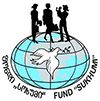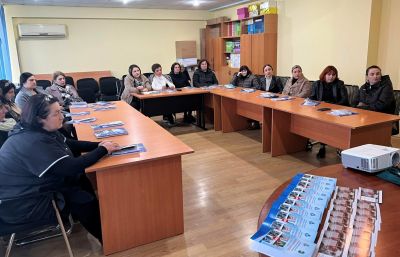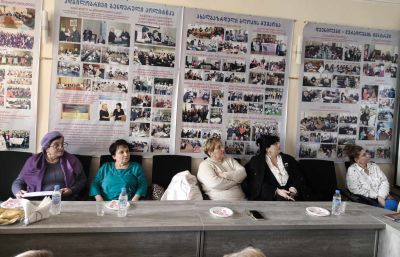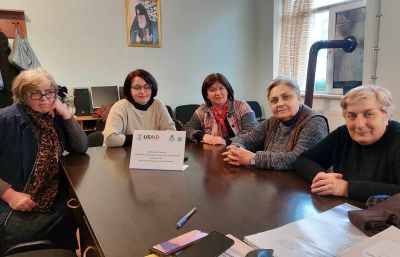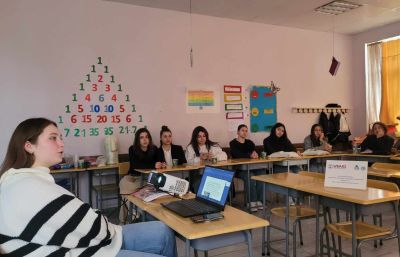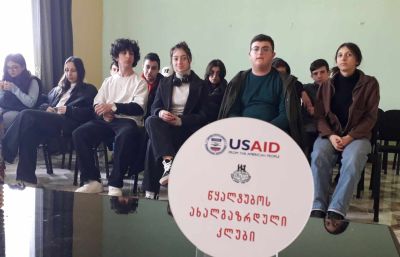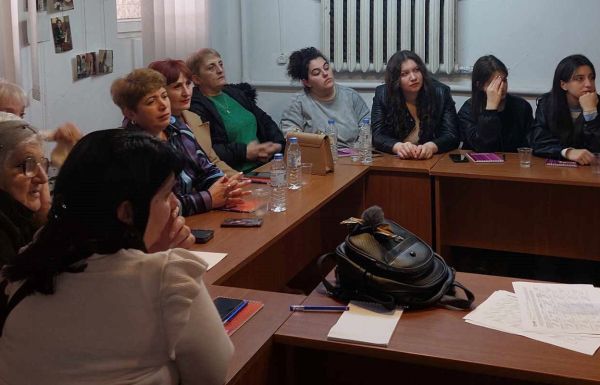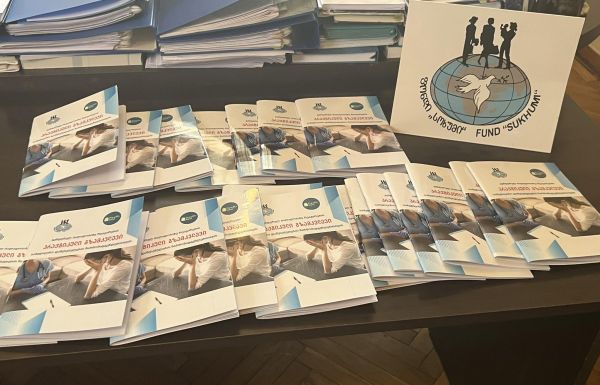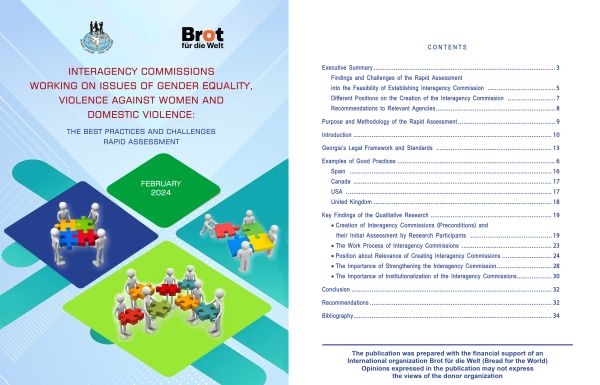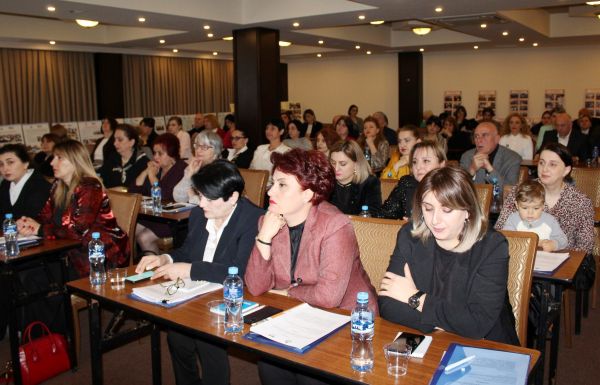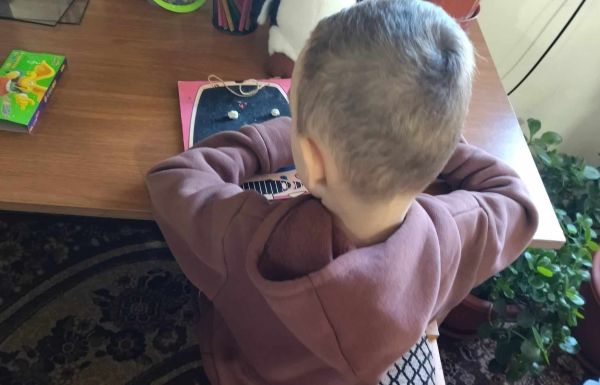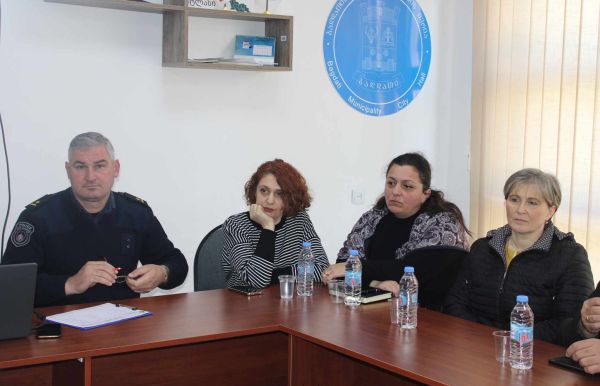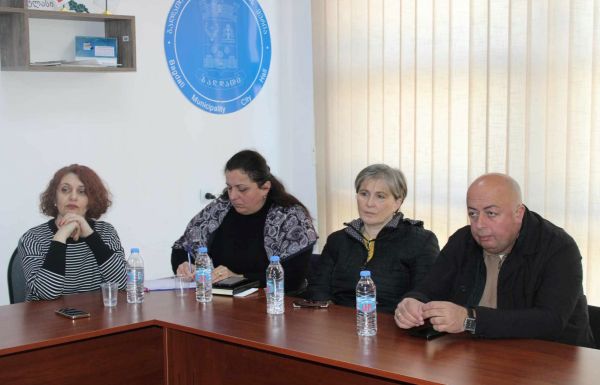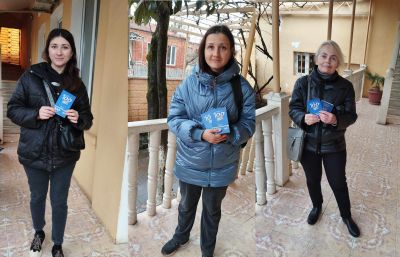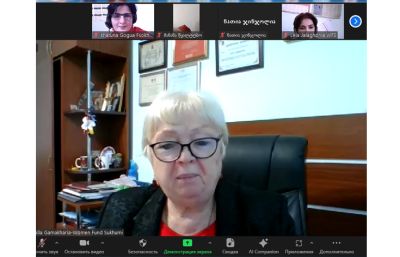The meeting participants - women and girls living in Kutaisi, in various IDP settlements - spoke about the priority problems and tasks that they have accumulated in their communities over the years. The list of main issues included infrastructure problems: faulty drainage system, water in basements, damaged condition of facades and roofs, etc. Access to health services (for reproductive, oncologic needs and people with disabilities) was also emphasized. Young people noted that there are no sports grounds and squares in many places.
The meeting participants decided that they would attend meetings of the City Council and actively participate in the local decision-making process in order to contribute to solving identified problems in IDP communities.
The project is implemented with the support of USAID local governance program
Informational meetings with medical staff on the topic “Violence against women and domestic violence - the role of doctors in violence prevention and victim assistance” were held in Tskaltubo, Terjola, Tsalenjikha, Senaki, Khoni, Kutaisi and Samtredia municipalities. The meetings were attended by: family doctors, emergency doctors, medical staff working in clinics and rural outpatient clinics.
The conversation touched on the law on combating violence against women/domestic violence, as well as referrals and specifically the role of medical personnel in identifying victims of violence and assisting the victims.
The meeting also included a presentation of the publication of the Women Fund “Sukhumi”, “Practical Guide to Responding to Gender-Based Violence for Representatives of Medical Institutions.”
The project is implemented with the support the Equality Fund (Canada)
We are pleased to present the Women Fund “Sukhumi” Rapid Assessment Report: “Municipal Interagency Commissions on Gender Equality, Violence Against Women, and Domestic Violence: Best Practices and Current Challenges”. The document aims to evaluate the relevance of establishing inter-agency commissions to improve collaboration and coordination between state agencies in tackling the issues related to violence against women and domestic violence. It additionally aims to assess the institutional capacities of existing commissions, their accomplishments, and the challenges they encounter.
Based on the research data, it is evident that interagency commissions have a crucial role in coordinating mechanisms for the prevention of violence against women and domestic violence. This is demonstrated by the actions of interagency commissions that have already been formed in several target municipalities. The commissions facilitate more effective local referral procedures, communication, and coordination among stakeholders involved in managing incidents of violence.
However, the analysis of challenges revealed that to establish meaningful changes, it is important to formalize the inter-agency commission further. This requires developing an articulated strategy and leveraging and implementing examples of good practices, both local and international. Additionally, raising awareness among municipality representatives and the general population, ensuring proper delineation of responsibilities with the Gender Equality Council, and encouraging involvement from representatives of diverse agencies in commission activities are essential.
The project is implemented with the support of the organization Brot
für die Welt - Evangelischer Entwicklungsdienst (Germany)
"Strengthening cooperation and coordination between municipalities and state agencies is crucial for an effective fight against violence against women.
Since 2009, the Women's Fund "Sukhumi" has consistently worked towards activating cooperation and coordination between municipalities and the entities involved in the referral mechanism, as well as sectoral state agencies. The conference held in Kutaisi on February 23, which brought together Women Fund “Sukhumi” partners, representatives from 17 municipalities in Western Georgia, and the central government, marked another significant step in strengthening this process.
"We are working together to create a non-violent and safe environment in our country," said Ekaterine Gamakharia, the head of the Tbilisi representative office of the Fund "Sukhumi."
Yana Koshelets is 37 years old and lives in Kutaisi with her husband and 15-year-old son. They fled the war from Mariupol. At first they lived in Germany, but the boy could not get used to studying and decided to come to Georgia...
Yana is one of those who benefit from consultations of a psychologist of the Women Fund “Sukhumi”. Psychologist Manana Gotsiridze held 4 meetings with families from Ukraine in February. She met with 13 refugees for the first time and planned further therapy, an individual psycho-rehabilitation continues with 6 beneficiaries.
The work of the psychologist with children is of particular importance. The mothers note with satisfaction that after the sessions their children have noticeably changed for the better...
The project is implemented with the support of the organization Brot
für die Welt - Evangelischer Entwicklungsdienst (Germany)
An ordinary meeting of the municipal Interdepartmental Commission was held in Bagdati. Members of the commission discussed the plan of activities that will be held in frames of the civil initiative. These activities will increase the awareness of the commission, which is necessary for its targeted work – for reviewing cases and responding to them in a timely manner.
The planned activities include increasing the involvement of representatives of the Mayor of the municipality, managers of preschool educational institutions and youth. All this is important for the effective functioning of the commission, for the timely identification and prevention of domestic violence.
The project is implemented with the support the Equality Fund (Canada)
The Women Fund “Sukhumi” held a round table meeting in Bagdati municipality with the participation of local referral entities.
The meeting was attended by members of the Gender Equality Council of the City Council, representatives of the City Hall and the police department. The participants talked about the prevention of domestic violence, protection of victims, and social partnership. Particular attention was paid to the problem of violence and effective cooperation with local structures.
The project is implemented with the support of the organization Brot
für die Welt - Evangelischer Entwicklungsdienst (Germany)
Ukrainians who are associated with us receive various types of assistance. Their total number now is 398 (20 people have been added since the beginning of the year).
In February, 55 food vouchers were issued to 37 families. Our organization helped two families with paying utility bills and 6 families with renting an apartment. As in previous months, expenses for telephone calls, medicines and medical procedures were reimbursed. In connection with all this, people who came from Ukraine express gratitude to the Women Fund “Sukhumi”.
The project is implemented with the support of the organization Brot
für die Welt - Evangelischer Entwicklungsdienst (Germany)
“Creating a network, defining the principles of the network and prospects for the future” - an online meeting of the network was held on this topic. It was attended by active leaders of women and girls from the IDP communities of Kutaisi, Khoni and Tskaltubo.
Project assistants assessed the work done and talked about the challenges. The speeches included information about the need to support women and strengthen partnerships.
During the next panel, the women who participated in the meeting emphasized the importance of the skills acquired during the trainings. They believe that participation in the project is a new opportunity for them to advocate for issues identified in their communities.
The work is carried out in partnership with the Center “Abkhazeti” within the framework of the project “Support of the conflict transformation in the South Caucasus and Moldova”.
